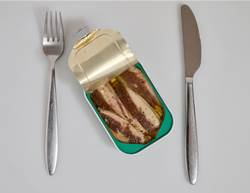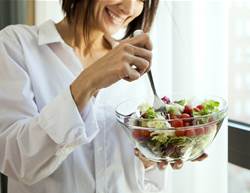Last summer, shortly after I publicly declared my renewed efforts to lose weight, I decided to give kilojoule counting another go. I ended up lasting about four months last time before once again jumping ship... and I'm not sure I'll ever go back.
While tracking kilojoules is certainly a great way to understand exactly what you're putting in your body, let's face it: It's super tedious. It may not be this way for everyone, but I get instantly annoyed when I go to bite into something and think: "I need to log those 475 kilojoules."
So I stopped.
At first I worried that my weight would spiral upward and felt a bit guilty for not sticking with my plan. However, I soon realized that counting kilojoules wasn't necessarily the best way for me to keep my weight in check. Here's what actually happened and what I learned in the process.
I was less stressed.
Each morning I start my day with a cup of coffee and wholegrain toast topped with natural peanut butter and honey. The ritual of making and enjoying that mini meal gives me a moment to wake up and set an intention for the day. It's my calm and peaceful time... and kilojoule counting ruined it. After all, there's nothing peaceful about rustling around searching for measuring spoons so I don't accidentally put too much milk in my coffee or write down that I ate a teaspoon of peanut butter when I really slathered on a tablespoon.
When I stopped logging kilojoules I was able to enjoy my morning ritual again. I took my peanut butter directly from the jar to the toast, without measuring first. I drank a second cup of coffee with skim milk without wondering if I was willing to "sacrifice" 295 kilojoules. All in all my mornings, and the rest of my day, were much more relaxed.
I ate more whole foods.
When I was counting kilojoules I was so focused on the numbers that I couldn't be bothered to pay much attention to things like vitamins, protein, and fibre. It was all about the bottom line—my kilojoule intake for the day—and I assumed I could eat whatever I wanted within those constraints. If a spoonful of ice cream had the same kilojoules as an apple, you can guess which one I opted for.
Of course, I know very well that ice cream and apples aren't equally nutritious. Once I let go of counting kilojoules I was more apt to consider how particular foods would (or wouldn't) fuel my body. The result was that I ended up eating more real foods and less processed junk. When I got the munchies between meals I'd eat that apple, or maybe a few nuts or a wholegrain cracker with a little hummus if I was really hungry.
I enjoyed treats more.
Grocery stores are full of products that have been altered and marketed to attract the number-crunching crowd. Almost anyone who has counted kilojoules has bought those mini snack-packs of their favorite snack, whether that is cookies or chocolate. Although these are marketed as healthy, on the rare occasions that I ate them I knew I wasn't making the best snack choices. Same goes for those sugar-free sweets, which usually gave me a stomach ache.
When I stopped counting kilojoules I stopped buying all those fake foods. If I crave chocolate, I now eat a piece of the real stuff and savour it. And it's way more satisfying than those sugar-free candies ever were.
My meals and snacks became more balanced.
When I stopped tracking kilojoules I still wanted to feel like I was in control of my diet, so I set a goal of incorporating a piece of fruit or vegetable into every meal or snack, as well as a little bit of protein (something I know from past experience works well for my body). By filling those requirements I set for myself, I automatically gravitated toward more balanced meals. In the past I might have had just a banana for a mid-morning snack, but now I might make a smoothie with banana, protein powder and spinach. Yes, it has more kilojoules than a single banana, but the balance of nutrients keeps me fuller for longer.
There was no big impact on my weight.
The main reason I was tracking kilojoules to begin with was, of course, to lose weight. What would happen when I stopped? The answer: Not a whole lot. I continued to lose about a kilo a month, which was consistent with what I had been losing after I recommitted to regular exercise nearly a year ago. For me, tracking kilojoules turned out to be a lot of extra work with not a lot of payoff.
That said, you can't just eat whatever you want and not expect your weight loss efforts to suffer. I still occasionally log my food intake for the day; I don't count kilojoules, but about once a week I keep a tally of what I'm eating just to stay mindful about what I'm putting in my mouth. (I initially tried doing this every day, but it turned out to be almost as tedious as tracking kilojoules.)
Tracking kilojoules isn't a bad thing to do, and it may be crucial for some people. But I really think the most important thing I can do is focus on good nutrition and eating intuitively (i.e. eating healthy food when I'm hungry and stopping when I'm full). After all, any kind of tracking may be useful in the short-term, but who really wants to scrutinize their diet that closely forever? I know I don't.










